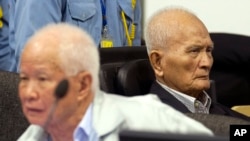The UN-backed Khmer Rouge tribunal is facing a new round of concerns over two controversial cases now wending their way through the court.
Cases 003 and 004 have been strongly opposed by top government officials and would require more indictments of former Khmer Rouge leaders to continue.
Legal experts say lawyers cannot move forward with their work without the indictments, which seem less and less likely as time moves on.
The tribunal’s investigating judges have not recognized lawyers for the potential defendants, while the international judges have not have the cooperation of their Cambodian counterparts, leading to stagnation in the two cases.
This creates questions around fair trials and around the efficacy of the investigation, said James Goldston, executive director of the Open Society Justice Initiative, which monitors the tribunal.
“Defense counsel can’t do their jobs properly to provide an effective defense if they don’t have access to the files, or if they can’t participate in investigations until it’s nearly concluded,” he said. “If the defense counsel has no access to the files, no one really knows what is happening or how the rights of the suspects are being protected. So we need some information from the investigating judges, the Office of the Co-Investigating Judges, to indicate what the status of the investigation is.”
Long Panhavuth, a tribunal monitor for the Cambodia Justice Initiative, said the international investigating judge, Mark Harmon, should accept lawyers for the suspects, which would allow them to begin working on the case.
“To allow the lawyer to access the case files, the lawyers need to be recognized by the co-investigating judges,” he said. It is possible that the judges don’t want to recognize lawyers until the suspects are indicted, he said.
As time goes on, however, the willingness of the court to actually indict the four remaining suspects in the case is in doubt.
The long process of the tribunal has frustrated victims of the regime, said Youk Chhang, director of the Documentation Center of Cambodia, which has provided information on the Khmer Rouge to the tribunal. The timing of the conclusion of investigations should be defined, to bolster confidence in the process, he said.
Tribunal spokesman Neth Pheaktra told VOA Khmer the investigations into both cases are ongoing and are scheduled to be completed by the middle of this year. Once the investigations are completed, he said, more information will be released.
Meanwhile, the court, which has spent some $200 million, is moving toward a verdict in the first of two phases for two aging Khmer Rouge leaders currently in custody, Nuon Chea and Khieu Samphan. It has so far only completed one trial, for Kaing Kek Iev, better known as Duch, who is serving a life sentence for his role in the supervision of the torture center, Tuol Sleng.
Without More Indictments, Tribunal Lawyers Face Difficulties
- Sok Khemara
- VOA Khmer

WASHINGTON DC —






